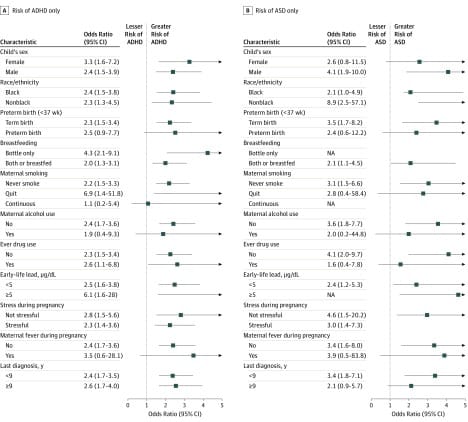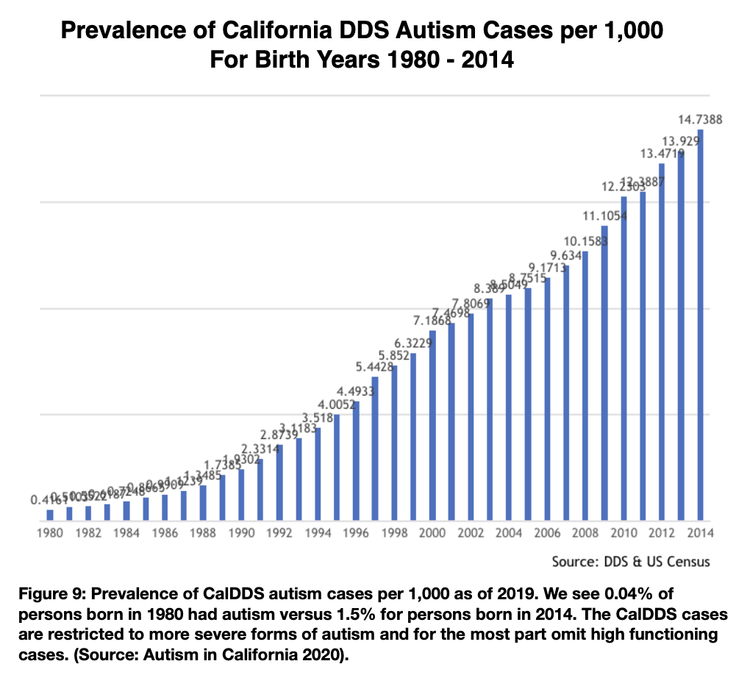Robert Kennedy Jr. recently started the process to add a warning to the labels of acetaminophen products, including Tylenol, noting a correlation between its use during pregnancy and autism and ADHD in children. The advisability of this is controversial. Experts at Scientific American say “the evidence against Tylenol is thin,” The British Journal, Nature, went further: “It’s Dangerous to Avoid Tylenol While Pregnant”, reversing its call for caution. Similarly, Barak Obama: “Trump’s announcement is violence against the truth.” Nature’s current logic is that any risk of Autism and ADHD is smaller than the risk if pregnant women do not take fever medication. Given the confusion and politicalization of the topic, I thought I’d write about the magnitude of the risk, and the logic to think Tylenol causes autism and ADHD.
The evidence that there is some, large risk agent is the tremendous rise in the prevalence of autism and ADHD over the last 50 years, see chart above. The rise t matches the rise in the use of Tylenol as opposed to older medications, like aspirin. Correcting for other changes (confounders), this Oxford study finds 95% certainty association of acetaminophen with ADHD; care being taken to remove confounders.
In terms of the magnitude of the Tylenol effect, this study from Johns Hopkins, compared fetal blood levels of acetaminophen enzymes (measured in the umbilical cord) to the risk of autism and ADHD. As shown below, there is roughly a three-times increase in risk for both in every sub-group of child: male and female, black and white, pre-term and full term, drug user or not, breast fed or not, fevered mother or not. Children with higher blood-acetaminophen levels (2nd, 3rd tercile) always have a higher chance of ADHD and ASD — about 3 times higher– than children in the lower tercile.

This European study found a similar association, but measured Tylenol use based on interviews. Between these studies, I find it reasonable to advise caution. This is the sort of evidence that caused us to put cancer warnings on cigarettes, caused us to caution against alcohol during pregnancy, and caused the mandate for seatbelts. This is usually what scientists use, it’s the best approach we have. I do not suggest dropping all fever medication, but suggest switching to older medications, like aspirin, or cool showers, or following the Harvard medical journal advice to take Tylenol in the minimum dose.
An upside to the political divide is that we’re likely to have better evidence in coming years. in Republican-leaning states, doctors have mostly favored the advisory. Meanwhile,in D-leaning states women are ignoring the advisory, some even filming themselves taking extra Tylenol, in distain for Trump. These two groups provide a controlled study, so that we should have have better data regarding Tylenol safety in 2-3 years.
Dr. Robert E. Buxbaum, October 12, 2025.
Added Oct. 20,2025: A cynical counter argument to the above, suggested by me ten years ago and others, is that there is no spike in ADHD, that it’s a scam perpetrated by teachers who prefer drugged students to antsy ones. If so, one could argue that the same genetics that make students antsy (ADHD and semi autistic) also affect Tylenol metabolism and use: Parents of such children take more Tylenol. Here is a good Swedish study that supports this view. If this proves to be true, the real scandal is how many normal students, mostly boys, have been drugged up and mis-educated.
